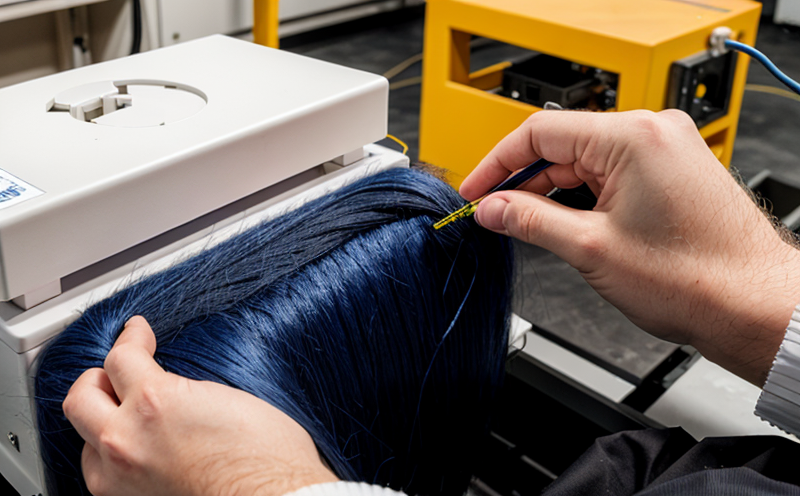GB/T 2910.3 Quantitative Chemical Analysis of Cotton and Polyester Mixtures
The GB/T 2910 series is a set of standards for the quantitative chemical analysis of textile fibers, developed by the Standardization Administration of China. The third part of this series, GB/T 2910.3, specifically addresses the determination of cotton content in polyester/cotton mixtures using an improved Soxhlet extraction method.
This service is critical for industries such as textiles and apparel manufacturing, where accurate identification and quantification of fiber components are essential for quality control and compliance with international standards. Cotton and polyester blends offer a range of benefits including comfort, durability, and breathability; however, the exact composition can vary widely depending on factors like processing methods and raw material sources.
The test procedure involves several steps: sample preparation, extraction using an organic solvent (typically methanol), drying, weighing, and calculation based on the mass loss. This method ensures precise measurements even when dealing with complex mixtures. The results provide valuable information for product development, supply chain management, and ensuring compliance with various international regulations.
Compliance with this standard is important not only within China but also internationally as many countries have adopted similar or equivalent standards such as ASTM D3825 in the United States. Accurate fiber composition analysis helps manufacturers maintain consistent quality across batches while avoiding potential issues related to non-compliant materials which could lead to recalls and reputational damage.
For research and development purposes, understanding the exact proportions of different fibers can guide innovation efforts aimed at creating new types of fabrics with improved performance characteristics. Additionally, this service supports procurement activities by providing reliable data on raw material quality that meets specific contractual requirements.
Scope and Methodology
| Step | Description |
|---|---|
| Sample Preparation | Cut the textile sample into pieces approximately 5 cm x 5 cm, remove any non-fiber materials such as threads or adhesives, and mix thoroughly. |
| Extraction | Place 2-3 g of the prepared sample in a Soxhlet extractor containing methanol. Extract continuously for at least four hours or until no further change in weight is observed. |
| Drying | Allow the extracted material to air dry completely before weighing it accurately on an analytical balance. |
| Weighing and Calculation | Calculate the cotton content by subtracting the weight of the polyester from the total sample mass. The result represents the percentage of cotton in the mixture. |
The entire process requires strict adherence to the specified conditions to ensure accurate results. Any deviation may affect the reliability and validity of the analysis. It is recommended that samples be tested by experienced personnel using calibrated equipment under controlled environmental conditions.
Eurolab Advantages
- Expertise: Our team consists of highly qualified professionals with extensive experience in textile analysis. They stay updated on the latest industry trends and technological advancements to deliver accurate results consistently.
- Comprehensive Services: Beyond just GB/T 2910.3 testing, we offer a wide range of other textile testing services including physical properties measurements like tensile strength, colorfastness tests, and more.
- State-of-the-Art Facilities: Equipped with advanced instrumentation such as FTIR spectrometers and scanning electron microscopes, our labs provide precise analyses tailored to meet your specific needs.
- Fast Turnaround Time: We understand the importance of timely delivery of results for decision-making processes. Our efficient workflow allows us to turn around reports quickly without compromising on quality.
By choosing Eurolab, you gain access to comprehensive support throughout your project lifecycle—from initial consultation through final report generation and interpretation. Whether you are looking to ensure regulatory compliance or drive innovation within your organization, our services will help you achieve optimal outcomes efficiently and effectively.
Quality and Reliability Assurance
- Calibration: Regular calibration of all instruments ensures that every measurement adheres to the highest standards. Our lab uses only certified equipment calibrated according to relevant international specifications such as ISO/IEC 17025.
- Quality Control Procedures: Each sample undergoes rigorous quality checks at multiple stages, including receiving, preparation, analysis, and reporting. These procedures are designed to minimize errors and ensure accurate results.
- Training: Our personnel receive ongoing training in best practices for textile testing ensuring they remain up-to-date with the latest techniques and methodologies.
- Data Security: Client data is handled securely following strict protocols. Access controls are implemented to prevent unauthorized access, and all communications use encrypted channels.
At Eurolab, we take pride in maintaining excellence throughout our operations. Our commitment to quality means that you can trust us to provide reliable results every time.





